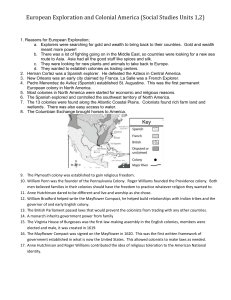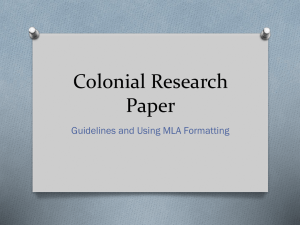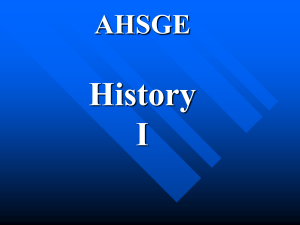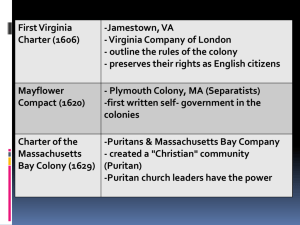TC US 2-1 through 2-4 The American Colonies Emerge
advertisement
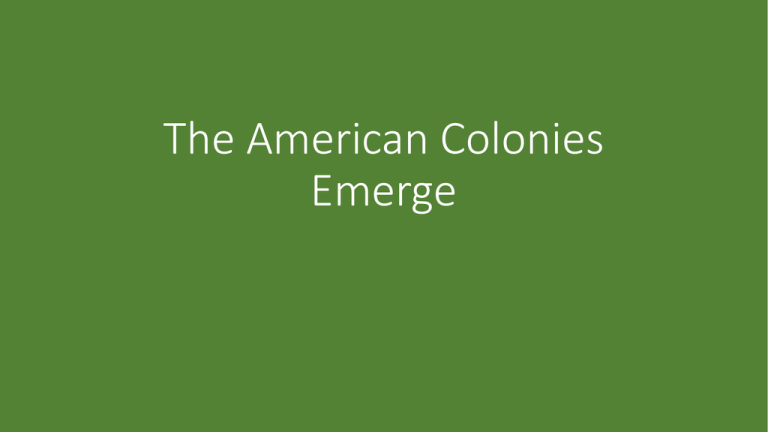
The American Colonies Emerge “The American Colonies Emerge” Outline • Spain in the Americas • Spain’s New Empire • Conquistadors Push North • Natives Resist Spanish • England in the Americas • • • • English Colonization Growth of Colonies Natives Resist English English Resist English • Puritan New England • Puritans and Pilgrims • Puritan Dissent • Natives Resist Expansion • Settlement of the Middle Colonies • The Dutch and New Netherlands • Religious Colonial Experiments • The Thirteen Colonies Spain in the Americas: Spain’s New Empire • Conquistadors • Spanish conquerors exploring for “Three G’s” • God, Glory, & Gold • Cortes and the Aztecs • Hernando Cortes – Arrived in the New World in 1504 (19 years old) • Quickly rose in rank for Spain • 1518 – Ordered to march to interior of Mexico and prepare for colonization • Hearing of their gold, he wants to take down Aztec • Throughout the march, Cortes creates alliances with other native groups that oppose the Aztec • Late 1519 – Cortes meets Aztecs, their leader Moctezuma • Demands force Aztec to rebel against Spanish • 1521 – After three years of marching, creating allies, and fighting, Cortes takes Aztec Empire Spain’s New Empire Cont’d • Cortes created New Spain, with the capital at Mexico City • Would set a pattern for Spanish conquistadors • Spanish Pattern of Conquest • Colonies funded by the monarchy • Lived among Native Americans, imposing the Spanish culture • Most colonizers were men, known as peninsulares • Peninsulares would marry native women, having children known as mestizos • Used natives as a source of slave labor through encomienda system Conquistadors Push North • Floridas (Early 1500s) • Juan Ponce de Leon – Famous Spanish conquistador in Florida • Looking for gold, but found fighting, disease, etc. • Also a destination of French privateers, or pirates • American Southwest (mid-1500s) • Francisco Vasquez de Coronada – Unsuccessfully searching for gold in region • New Mexico would become an epicenter of Catholic teachings • Efforts to convert native peoples living in the area Natives Resist Spanish • Causes of Rebellion in the Southwest • Forced religious practices • Removal of sacred Native American objects • Implementation of Spanish culture • Popé’s Rebellion • Popé – One of the Pueblo religious leaders, organized and led a rebellion of 17,000 natives against Spanish • Spanish lose Southwest to natives 3-2-1 Exit Slip • 3 things you learned • 2 things you found interesting • 1 thing you still have questions about England in the Americas: English Colonization • English Pattern of Colonization • Originally funded and maintained by joint-stock companies, or groups of wealthy investors hoping to cash in on new resources • Prohibited Native Americans from wearing English clothing or using English weapons • Did not intermarry with natives • Struggles of Colonization • Disease and hunger killed most colonizers • Conflict with Native Americans • Settlers were not prepared for freezing temperatures Growth of Colonies • Turnaround at Jamestown • Jamestown – First permanent English settlement (1607, Virginia) • At first, saw similar struggles as other colonies • John Smith took charge, with help of Powhatan people, saved colony • “Brown Gold” • Tobacco became the cash crop of the New World • Headright system encouraged immigration by offering 50 acres to those buying passage for themselves or others • Indentured servants provided labor, signing on for 4-7 years of servitude for paid passage to the land Growth of Colonies Cont’d • First African Laborers • Twenty Africans arrived in Virginia in 1619 • They assumed the role of indentured servants • After a few years of service, most received land and freedom • Would take a few years for the system of slavery to catch on • Why Freedom? • Tobacco is a relatively low-labor crop • Slaves would cost 2-3 times more than indentured servants Natives Resist English • Forms of Native Resistance • Violence towards colonists • Destroying of livestock, buildings, etc. • Refusal to obey • Fighting Powhatan • Originally, the group John Smith urged to help colonists • Powhatan began to attack livestock & buildings as colonist numbers grew • Colonists returned assaults, hostilities continued • To stop violence, King James made Virginia a royal colony under direct control of the king English Resist English • Reasons for Hostility • Poorer settlers and former indentured servants could not afford land • Only white, landholding men could vote • Poor could not vote • Bacon’s Rebellion • Nathaniel Bacon – Wealthy farmer that sympathized with poor • Led a rebellion to protest unfair taxes and little representation • Protest turned violent and gained the attention of the king Exit Slip • Why were joint-stock companies interested in the New World? • What was the significance of the Jamestown colony? • Briefly describe a form of Native American resistance against English colonists Puritan New England: Puritans and Pilgrims • Puritans – Church members that wanted to “purify” or reform the Church of England • Migrated to the New World to create a model society • Still wanted to remain a part of the Church of England • Pilgrims – Wanted to separate from the Church of England (also known as separatists) • Migrated to the New World to create a model COUNTRY • Created the Plymouth Colony – The second permanent English colony in North America Puritans and Pilgrims Cont’d • Some Puritans wanted to remain part of the Church, but move to the New World • John Winthrop formed the Massachusetts Bay Colony • Capital at Boston • “City Upon a Hill” • Church and state had a relationship • Government figures were viewed as God’s “elect” – chosen by God to do his work Puritan Dissent • Dissenter – Person going against the responsibilities outlined by the colony • Roger Williams • Said religion should not be forced by gov’t • Thought English should buy land from Native Americans • Would be ordered to leave for England, but escaped to create the colony of Providence • Anne Hutchinson • Said worshippers could interpret the Bible themselves • Banished, she left first for Rhode Island then to New York Natives Resist Expansion • Disputes with Native Americans primarily arose over land • Natives thought no one owned land • Europeans saw land as something to buy • The Pequot War • Puritans vs Pequot tribe • Puritans sided with Narragansett, a rival tribe of the Pequot • Ended May 1637 with the massacre of about 500 Pequot men, women, and children Natives Resist Expansion Cont’d • King Philip’s War • Colonists vs Wampanoag • Native Americans attacked using guerilla tactics (quick attacks followed by retreat) • The brutal war killed 10% of the men of fighting age in New England • Purpose of War • Colonists – Gain land, make current land safer • Native Americans – Prevent the spread of English Exit Slip • Describe the difference between Puritans and Pilgrims. • Define dissenter. Give an example of a dissenter in the New England colonies. • What were the goals of war for colonists? Native Americans? Settlement of the Middle Colonies: The Dutch and New Netherlands • A Diverse Colony • Dutch West India Company granted the permission to colonize New Netherland in 1621 • Profited mostly from fur trade • Trying to grow, the colony accepted ANYONE….Europeans, Africans, etc. • Got along well with Native Americans b/c of need to trade • English Takeover • Dutch separated Northern and Southern colonies of England • King Charles II granted James II permission to take out Dutch • Arrived and took Dutch colony w/o fight • James II became proprietor, or owner, of colony….renamed it New York Religious Colonial Experiments • Quakers were radical Christians • Said anyone could communicate with God • Allowed community to serve as “pastor” • Opposed and refused to participate in war • William Penn created the colony of Pennsylvania • Considered the colony a “holy experiment” • Every male was given 50 acres and the ability to vote • Openly embraced Native Americans and oversaw trade with them • Court was composed of colonists and Native Americans • Also governed colony of Delaware • Legacy of William Penn • Equality • Cooperation • Religious tolerance The Thirteen Colonies • 1600s-1700s saw the formation of several British colonies • Maryland, North Carolina, South Carolina, and Georgia were all granted charter by England, and eventually taken by British crown • Unique characteristics • Religious freedom • Equal representation • Outlawing of slavery • By 1752, thirteen colonies exist • All are seeing a growing desire for independence Exit Slip • Why did England want to gain the colony of New Netherlands? • What motivated William Penn to create the colony of Pennsylvania? • List some of the unique characteristics of the thirteen original colonies.
